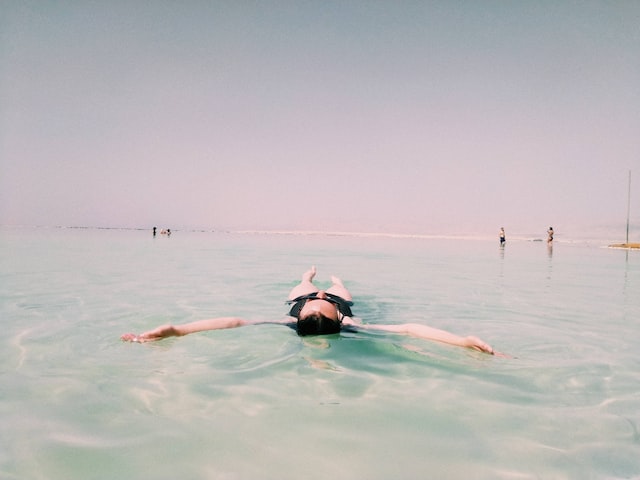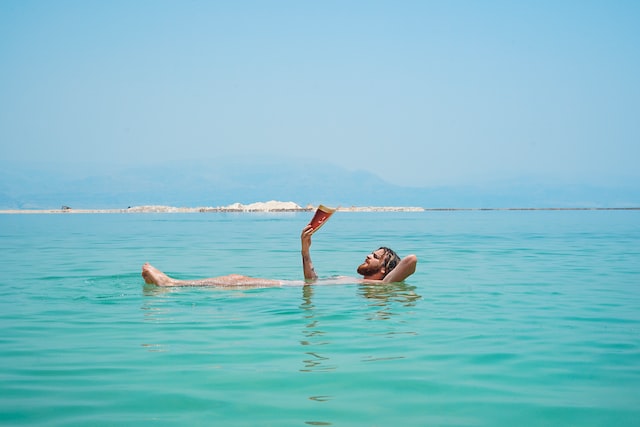Can you scuba dive in the Dead Sea?
It is not recommended to scuba dive in the Dead Sea because the water is extremely salty and the visibility is poor. The salt concentration of the water is much higher than in the ocean, and it can be harmful to scuba diving equipment. Additionally, the water is murky due to its high mineral content, which makes it difficult to see underwater. The Dead Sea is also very shallow in comperation with other seas and oceans, with a maximum depth of about 304 meters (997 feet)- So in general the Dead Sea is not suitable for scuba diving.
While it is not recommended to scuba dive in the Dead Sea, it is possible to participate in other water activities, such as swimming or floating on the surface. It is important to be cautious and follow the guidelines and recommendations of local authorities when engaging in any water-related activities in the Dead Sea.
Why is the Dead Sea so salty?
The Dead Sea is located in the Jordan Rift Valley and is bordered by Israel, Palestine, and Jordan. It is a saltwater lake that is about 304 meters (997 feet) below sea level, making it the lowest point on Earth. The Dead Sea is fed by the Jordan River, but it has no outlet, which means that the water that enters the lake does not flow out. As a result, the water in the Dead Sea becomes increasingly salty as the minerals in the water evaporate.
The high salt content is due to the high evaporation rate in the region. Which causes the water to become increasingly concentrated with minerals. The Dead Sea is also rich in other minerals, including magnesium, potassium, and calcium, which are believed to have therapeutic properties.
Is there life in the Dead Sea?
The high salt content of the Dead Sea makes it inhospitable to most forms of marine life, which is why it is called the “Dead Sea”. However, some types of bacteria and algae can survive in highly saline environments.
There is very little life in the Dead Sea due to the high concentration of salt in the water. The salt content of the Dead Sea is about 10 times saltier than the average salt water found in the ocean, making it inhospitable to most forms of marine life.
In addition to bacteria and algae, there are also some invertebrates, such as sea shrimps and certain types of insects, that can survive in the harsh conditions of the Dead Sea. These species have developed special adaptations that allow them to survive in environments with high salt content.
Despite the limited diversity of life, the Dead Sea has been an important resource for humans for thousands of years. The minerals found in the water and mud along the shore are believed to have therapeutic properties, and the lake has been a popular destination for tourists looking to take advantage of these benefits.
Snorkeling in the Dead Sea
Snorkeling in the Dead Sea is not recommended due to the high salt concentration of the water and poor visibility. The salt content of the water is much higher than in the ocean, and it can be harmful to snorkeling equipment. Additionally, the water is cloudy due to its high mineral content, which makes it difficult to see underwater.
However, it is possible to float on the surface of the Dead Sea due to the high salt content, which makes it easier to stay afloat. Many people visit the Dead Sea for its therapeutic properties and to enjoy the unique experience of floating on the water.
If you are interested in snorkeling, it is recommended to choose a location with clear, saltwater that is suitable for snorkeling. There are many beautiful places around the world where you can enjoy snorkeling and see a variety of marine life. It is important to be cautious and follow the guidelines and recommendations of local authorities when engaging in any water-related activities.
Swimming in the Dead Sea (Are you sinking?)
It is possible to swim in the Dead Sea, but it is not like swimming in a typical pool or ocean. Due to the high salt concentration of the water, it is easier to float on the surface of the Dead Sea than in any other water. Many people visit the Dead Sea to take advantage of this unique experience and to float on the surface of the water.
However, it is important to be cautious when swimming in the Dead Sea. The water is extremely salty, and it can be harmful to your skin and eyes if you get it in your mouth or eyes. It is recommended to wear goggles or a mask to protect your eyes and to avoid swallowing any of the water.
When swimming in the Dead Sea, it’s significant to abide by local authorities’ rules and recommendations. The sea is in a desert area, and the water there can get quite warm, especially in the summer. To prevent overheating, it’s critical to drink plenty of water and take rest breaks in the shade.

Why visit the Dead Sea?
The Dead Sea is a well-liked tourist destination because of its special location and healing qualities. It is situated in the Jordan Rift Valley and is surrounded by Israel, Palestine, and Jordan.
Many visitors find floating on the surface of the Dead Sea to be an unusual and enjoyable experience due to the water’s high salt content. In addition, water is abundant in minerals like magnesium, potassium, and calcium, which are thought to have medicinal benefits. To take advantage of these advantages and to unwind and rejuvenate, many people travel to the Dead Sea.
In addition to swimming and floating, the Dead Sea is also a popular destination for tourists who are interested in the history and culture of the region. The area around the Dead Sea is home to a number of ancient sites, including the city of Jericho, which is believed to be one of the oldest continuously inhabited cities in the world. The Dead Sea is also home to a number of luxury resorts and spas, which offer a range of amenities and treatments.
Overall, the Dead Sea is a unique and fascinating destination that offers a variety of experiences and activities for visitors.
Thank you for reading! Check out the dates for Deep Week 2023 here.
